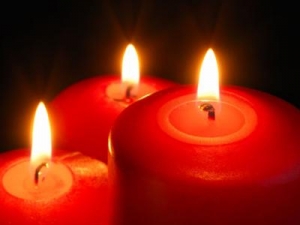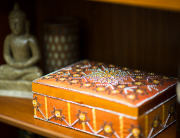Grieving the death of someone important to you is one of life’s most difficult transitions. And one of the most difficult periods of that transition is the first holiday season when someone you love isn’t there. It includes a grieving of the here-and-now absence of that person, as well as grieving for future losses.
One of the tasks of grieving during the holidays is to re-examine and re-evaluate family traditions and rituals. You may find comfort in some traditions and want to carry them on, but if you find them unbearable, you can create new rituals or alter the old traditions just enough that you can continue them – without making it so painfully obvious that your loved one is absent. Do you want to continue hosting the Thanksgiving meal or would it be more bearable to continue the tradition at another family member’s home? Would the tradition of opening Christmas presents together on Christmas morning be more bearable if done on Christmas Eve instead? If you usually send a holiday letter, would it be easier this year to simply send a card? Author and grief blogger Robbie Miller Kaplan described a reader who traditionally hosted the family holidays, but decided to leave town after her spouse’s death. Instead of taking care of the family with dinner and presents, she went to a spa and let someone take care of her. It gave her the space to recharge and rethink her role in her family and by the second year, she was ready to create new family traditions.
Creating holiday rituals is a way to give special meaning to those you love who are with you now, as well as those for whom you grieve.
I recommend two guidelines for creating healing holiday rituals:
1. Don’t do anything you really don’t want to do. Don’t let yourself be forced into doing things you don’t want to do or don’t feel up to, solely to keep others happy. Let your limits be known to well-meaning friends or family who may be determined to not let you be sad or alone during the holiday.
2. If there’s anything you’d really like to do, make sure you do it. It’s not selfish to put yourself first in order to take care of yourself — and possibly avoid a grief meltdown in the middle of a family gathering. In reality, the highest good for everyone will be better served if you let others know what you need and how they can best help you during this difficult life passage.
Creating healing holiday rituals is a way to give special meaning to those you love who are with you now, as well those for whom you grieve. There are many ways to honor the memory of the loved one you are missing, while still celebrating the holidays with family and friends that are still with you. You may want to:
- Begin your holiday dinner with a toast in honor of your loved one
- Light a candle in honor of your loved one at Thanksgiving dinner
- Dedicate one of the Hanukkah candles in memory of your loved one
- Dedicate a holiday song or hymn to the memory of your loved one
- After the holiday meal, play one of your loved one’s favorite holiday songs or watch one of his or her favorite movies together as a family
Some rituals serve to symbolize both the loss and sadness, as well as hope for the future.
One of the most powerful and paradoxical ways to deal with grief during the holidays is to do something for someone else. You may want to:
- Donate a gift in your loved one’s name
- Serve a meal at a homeless shelter together in honor of the loved one you are missing
- Invite a guest to share in your holiday festivities
- Volunteer to read or spend time during the holidays with the elderly in nursing homes
- Offer a scholarship in a loved one’s name
Some rituals serve to symbolize both the loss and sadness, as well as hope for the future. A beautiful example from Hosparus worker Elaine Tiller is how one family left their dad’s chair empty at the holiday meal and turned over the function of carving the turkey to the eldest child. Healing rituals such as these help you create meaning for your loss, help you absorb the significant changes that have taken place in your life, and serve as an ongoing memorial to your loved one. You may want to:
- Visit the cemetery and decorate the memorial with holiday decorations
- Create a special commemorative Christmas ornament for your tree
- Hang a Christmas stocking in honor of your loved one
- Each holiday season record your reflections of the ups and downs you have experienced in the past year and place it in the Christmas stocking
- Plan a meal with your loved one’s favorite foods
The healing effect of reaffirming some traditions, revising others and creating entirely new ones provides hope for the future while honoring the past. Rituals are a powerful way to honor the loved one you are missing and offer great comfort during a difficult time.



























